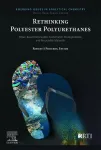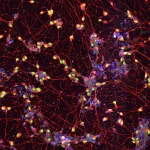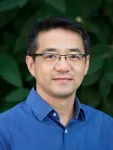(Press-News.org) The University of California San Diego’s vision is to be a student-centered, research-focused, service-oriented public university. There are countless examples across campus of the ways these three pillars are upheld, but it is unique to find all three incorporated at once. Now a new book on algae-based biodegradable plastics showcases student research and the monumental potential it has to change consumerism on a global scale.
Statistics on the environmental damage of plastics are stark: in 2018, U.S. landfills received 27 million tons of plastic (U.S. Environmental Protection Agency); up to 199 million tons of plastic may exist in our oceans (United Nations Environment Programme); and it can take up to 450 years for plastic bottles and diapers to decompose (World Economic Forum).
Researchers at UC San Diego have spent many years developing a biodegradable plastic alternative made from algae. This algae-based polymer has already been used to make surfboards, flip flops and walking shoes. Rethinking Polyester Polyurethanes: Algae-Based Renewable, Sustainable, Biodegradable and Recyclable Materials (Emerging Issues in Analytical Chemistry), published by Elsevier, details the basic science of creating bio-based polymers, lifecycle assessments and a techno-economic analysis.
Edited by Professor of Chemistry and Biochemistry Robert “Skip” Pomeroy, and largely written during the pandemic, the book’s contributing authors include UC San Diego faculty, research scientists, postdoctoral scholars, alumni, and graduate and undergraduate students.
“The academic teaching labs at UC San Diego are intentionally designed to foster collaboration among dedicated individuals and groups who are seeking solutions to the growing sea of plastic that plagues our oceans,” said Chancellor Pradeep K. Khosla. “Robert Pomeroy, Michael Burkart and Steven Mayfield have engaged a diverse set of perspectives from students, industry and the community in their efforts to apply innovation and an entrepreneurial mindset to protect our planet’s resources. They reflect our campus commitment to taking bold, creative actions to solve one of the world’s most challenging problems.”
Redefining Recycling
For all the attention it receives, recycling is often prohibitively expensive and inefficient. Only a small fraction of plastics are recycled, and most new plastic products are not made from recycled materials.
Pomeroy’s lab specializes in analytical chemistry, which he believes can help us redefine terms like “recyclable” and “biodegradable.” A chapter in the book about greenwashing — claiming something is environmentally friendly when it’s not — takes a closer look at these labels.
He points out that just because an item can be recycled doesn’t mean it gets put into the recycling bin, and even then, it may not make it to a recycling plant. For instance, plastic-coated milk cartons are technically recyclable, but there aren’t any facilities in California that recycle them. Many times, these kinds of “recyclable” items are simply burned.
Another example is using the word “biodegradable.” Sometimes manufacturers will include a small amount of inert material, such as wood fiber, in a plastic product and claim it is biodegradable. “All they’re doing is creating microplastics,” said Pomeroy. “Now we’re challenging the words. We’re challenging the definitions. This is where the analytical chemistry comes in. We want to establish a right way to do this.”
Fundamentally, Pomeroy believes we need to change the way we think about plastics, including single-use plastics, such as straws and medical supplies. While paper straws disintegrate too quickly — often mid-drink — ones made from algae polymers will hold their structural integrity long enough to be useful, but then biodegrade in a fraction of the time of a plastic straw.
“We need to be more thoughtful about making the lifetime of the product match the lifetime of its use,” Pomeroy stated.
Rewriting the Text
Pomeroy wanted the book to be relevant and to show the science, but also to be something that was readable without speaking over people’s heads or talking down to them. It is meant to be a resource to industry professionals involved in the sales, marketing or manufacture of polyurethane products; those in regulatory roles who want to understand the advantages of bio-based materials; and those involved in the research of bio-based materials, including students in environmental chemistry, engineering and materials science.
Pomeroy found eager students from across disciplines to work in his lab and contribute to writing chapters. “Some students are from chemistry, some are chemical engineers, some are statisticians, some are biologists,” he stated. “They come from a lot of different places. Sometimes the best research opportunities aren’t in your department.”
One student was Anton Samoylov, who graduated in 2021 with a B.S. in chemical engineering, and began working in Pomeroy’s lab as a freshman. Although he wasn’t a chemistry major, during a Triton Day lab tour, Samoylov was drawn in as Pomeroy enthusiastically discussed his work in developing algae surfboards and the potential of algae as a biofuel and renewable plastic.
As an undergraduate, Samoylov worked on the book with two mentors, postdoctoral scholars An Phung and Bhausaheb Rajput, whom he already knew from working together on making microfluidic flow systems for polyurethane precursor synthesis.
Now a graduate student at the University of Arizona, studying chemical and environmental engineering, Samoylov said, “Having small groups of authors for each chapter was great because I had the ability to engage deeply with the writing process. Because of the work we did together, I felt comfortable and proud taking ownership of that book chapter. Skip’s lab definitely provided me unique opportunities.”
Rethinking the Student Experience
“Why do students come to UC San Diego? Is it to sit in a lecture hall with 300 other students or is it because there is an opportunity to participate in the life of the university?” Pomeroy asked.
“Everyone who worked on this book — they got hands-on lab experience; they published research papers; they interacted with our start-up company, Algenesis. I think that is a huge added-value not many other universities can provide.”
It was also important for students to see what the life of a faculty researcher was like. “We do have enviable jobs, but we work hard. And we work hard because we’re passionate about it,” Pomeroy stated. “I want our students to see that this is our life, but it could be their life too. If they put in the work, they can be leaders in their field.”
One emerging leader is Miheer Modi, who earned his bachelor’s and master’s degrees in chemistry from UC San Diego, and is now a research associate with Scripps Research. In working on the book, Modi learned how to sift through large quantities of information, see a project through to completion and pace himself to achieve long-term goals — traits that have proved useful in his current position.
“I have tremendous respect and admiration for Dr. Pomeroy’s insight,” Modi said. “His lab gave me that safe space and opportunity where I could explore and develop my passion for analytical chemistry, which has now led to a job I thoroughly enjoy.”
END
Rethink, rewrite, redefine—how biodegradable plastics are reshaping sustainability
A new book written by UC San Diego researchers and students makes a case for the future of algae-based materials
2023-06-01
ELSE PRESS RELEASES FROM THIS DATE:
ComboMATCH investigators are translating robust pre-clinical evidence for new anti-cancer drug combinations into a series of early-phase clinical trials
2023-06-01
Five leading cancer research organizations in the United States are jointly announcing the start of patient enrollment in Molecular Analysis for Combination Therapy Choice (ComboMATCH), a unique, precision medicine initiative to test new combinations of cancer drugs guided by tumor biology. The Alliance for Clinical Trials in Oncology, Children's Oncology Group, ECOG-ACRIN Cancer Research Group, NRG Oncology, and SWOG Cancer Research Network plan to conduct many early-phase treatment trials through this platform in collaboration with the National Cancer Institute (NCI) National Clinical Trials Network (NCTN). NCI is part of ...
Parkinson’s disease drug ropinirole safely slowed the progression of ALS for over 6 months in a clinical trial
2023-06-01
Amyotrophic lateral sclerosis (ALS), also known as Lou Gehrig’s disease, is a fatal motor neuron disease that causes people to gradually lose control of their muscles. There is no cure, and current treatments focus on reducing symptoms and providing supportive care. Reporting June 1 in the journal Cell Stem Cell, researchers from Japan show in an early clinical trial that the Parkinson’s disease drug ropinirole is safe to use in ALS patients and delayed disease progression by 27.9 weeks on average.
Some patients were more responsive to ropinirole treatment than others, and the researchers ...
The 'breath' between atoms — a new building block for quantum technology
2023-06-01
University of Washington researchers have discovered they can detect atomic "breathing," or the mechanical vibration between two layers of atoms, by observing the type of light those atoms emitted when stimulated by a laser. The sound of this atomic "breath" could help researchers encode and transmit quantum information.
The researchers also developed a device that could serve as a new type of building block for quantum technologies, which are widely anticipated to have many future applications in fields such as computing, ...
CHOP researchers use “deep sequencing” to identify several previously undescribed genetic variants in vascular anomalies
2023-06-01
Philadelphia, June 1, 2023 – Researchers from Children’s Hospital of Philadelphia (CHOP) recently discovered that extremely thorough “deep sequencing” of the genome in tissue samples and cell-free DNA of patients with potentially life-threatening vascular anomalies captured several genetic variants related to disease that were not captured with conventional genetic sequencing methods. More than 60% of patients saw an improvement in their condition after being placed on targeted therapies related to these newly found genetic variants. The findings were published today in the journal Nature Medicine.
Vascular ...
Quantifying mangroves’ value as a climate solution and economic engine
2023-06-01
A tiny Central American country is charting a path to slowing climate change, while boosting the economy and making communities safer. A new Stanford-led study quantifies the value of Belize’s coastal mangrove forests in terms of how much carbon they can hold, the value they can add to tourism and fisheries, and the protection they can provide against coastal storms and other risks. Importantly, the findings, published June 1 in Nature Ecology and Evolution, have already provided a basis for Belize’s commitment to protect or restore additional mangrove forests totaling an area about the size ...
Smart thermometer–based participatory surveillance to discern the role of children in household viral transmission during pandemic
2023-06-01
About The Study: In this study using smart thermometers to measure within-household transmission at a national scale, researchers discerned an important role for children in the spread of viral infection within households during the COVID-19 pandemic, heightened when schools were in session, supporting a role for school attendance in COVID-19 spread.
Authors: Kenneth D. Mandl, M.D., M.P.H., of Boston Children’s Hospital, is the corresponding author.
To access the embargoed study: Visit our For The Media website at this link https://media.jamanetwork.com/
(doi:10.1001/jamanetworkopen.2023.16190)
Editor’s ...
Global, race-neutral reference equations and pulmonary function test interpretation
2023-06-01
About The Study: The use of race-neutral reference equations to interpret pulmonary function tests resulted in a significant increase in the number of Black individuals with respiratory impairments along with a significant increase in the severity of the identified impairments. More work is needed to quantify the effect these reference equations would have on diagnosis, referral, and treatment patterns.
Authors: Alexander T. Moffett, M.D., of the University of Pennsylvania in Philadelphia, is the corresponding author.
To access the embargoed study: Visit our For The Media website ...
Efficacy, safety of atropine for the treatment of pediatric nearsightedness progression over 3 years
2023-06-01
About The Study: The efficacy and safety observed in this randomized clinical trial suggest that low-dose atropine may provide a treatment option for childhood myopia progression.
Authors: Karla Zadnik, O.D., Ph.D., of the Ohio State University College of Optometry in Columbus, is the corresponding author.
To access the embargoed study: Visit our For The Media website at this link https://media.jamanetwork.com/
(doi:10.1001/jamaophthalmol.2023.2097)
Editor’s Note: Please see the article for additional information, including other authors, author contributions and affiliations, conflict of interest and financial ...
Personalizing prostate cancer screening may improve the accuracy of detection
2023-06-01
The accuracy of prostate-specific antigen (PSA) screening for prostate cancer can be improved by accounting for genetic factors that cause changes in PSA levels that are not associated with cancer, according to a multi-center study led by UC San Francisco and Stanford University.
In a study publishing June 1, 2023 in Nature Medicine, UCSF researchers and their collaborators conducted a large genome-wide association study of PSA in more than 95,000 men without diagnosed prostate cancer, which identified over 80 novel PSA-associated variants. They set ...
NIH’s ComboMATCH initiative will test new drug combinations guided by tumor biology
2023-06-01
The National Cancer Institute (NCI) has launched a large precision medicine cancer initiative to test the effectiveness of treating adults and children with new drug combinations that target specific tumor alterations. Known as the Combination Therapy Platform Trial with Molecular Analysis for Therapy Choice (ComboMATCH), the initiative is the largest of its kind to test combinations of cancer drugs guided by tumor biology. The endeavor aims to identify promising treatments that can advance to larger, more definitive clinical ...
LAST 30 PRESS RELEASES:
Call me invasive: New evidence confirms the status of the giant Asian mantis in Europe
Scientists discover a key mechanism regulating how oxytocin is released in the mouse brain
Public and patient involvement in research is a balancing act of power
Scientists discover “bacterial constipation,” a new disease caused by gut-drying bacteria
DGIST identifies “magic blueprint” for converting carbon dioxide into resources through atom-level catalyst design
COVID-19 vaccination during pregnancy may help prevent preeclampsia
Menopausal hormone therapy not linked to increased risk of death
Chronic shortage of family doctors in England, reveals BMJ analysis
Booster jabs reduce the risks of COVID-19 deaths, study finds
Screening increases survival rate for stage IV breast cancer by 60%
ACC announces inaugural fellow for the Thad and Gerry Waites Rural Cardiovascular Research Fellowship
University of Oklahoma researchers develop durable hybrid materials for faster radiation detection
Medicaid disenrollment spikes at age 19, study finds
Turning agricultural waste into advanced materials: Review highlights how torrefaction could power a sustainable carbon future
New study warns emerging pollutants in livestock and aquaculture waste may threaten ecosystems and public health
Integrated rice–aquatic farming systems may hold the key to smarter nitrogen use and lower agricultural emissions
Hope for global banana farming in genetic discovery
Mirror image pheromones help beetles swipe right
Prenatal lead exposure related to worse cognitive function in adults
Research alert: Understanding substance use across the full spectrum of sexual identity
Pekingese, Shih Tzu and Staffordshire Bull Terrier among twelve dog breeds at risk of serious breathing condition
Selected dog breeds with most breathing trouble identified in new study
Interplay of class and gender may influence social judgments differently between cultures
Pollen counts can be predicted by machine learning models using meteorological data with more than 80% accuracy even a week ahead, for both grass and birch tree pollen, which could be key in effective
Rewriting our understanding of early hominin dispersal to Eurasia
Rising simultaneous wildfire risk compromises international firefighting efforts
Honey bee "dance floors" can be accurately located with a new method, mapping where in the hive forager bees perform waggle dances to signal the location of pollen and nectar for their nestmates
Exercise and nutritional drinks can reduce the need for care in dementia
Michelson Medical Research Foundation awards $750,000 to rising immunology leaders
SfN announces Early Career Policy Ambassadors Class of 2026
[Press-News.org] Rethink, rewrite, redefine—how biodegradable plastics are reshaping sustainabilityA new book written by UC San Diego researchers and students makes a case for the future of algae-based materials




